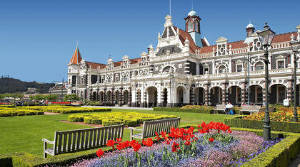
Value growth remains modest on a nationwide basis, according to the latest QV House Price Index.
It shows that national values went up by 1.3% in the three months to November and by 3.5% year-on-year, leaving the average value at $681,545.
But the “more affordable” main centres, particularly Dunedin and the wider Wellington region, continue to show a strong rate of growth.
Dunedin’s values continue on an upward trend, increasing by 3.8% over the past three months and by 11.7% year-on-year. This left the city’s average value at $431,665.
Across the wider Wellington region, values rose by 4.0% over the three months to November and by 8.1% year-on-year, leaving the average value at $685,387.
There was also strong quarterly value growth in many regional markets, including Whangarei (up 6% to $563,312) and Palmerston North (up 5.1% to $419,089).
QV general manager David Nagel says these regions appeal to a broad range of buyers, particularly first home buyers and investors, due to their relative affordability and the higher yields on offer.
“These factors enable the values in these regions to continue their upward trend, even in a cooling market.”
In contrast, the “top-end” of the market – those areas with average values above one million like the Queenstown Lakes – are generally experiencing a cool down in market activity and growth.
Likewise, value growth across the Auckland Region remains flat. It was up 0.1% over the past three months and by 0.4% year-on-year, leaving the region’s average value at $1,050,647.
Going forward, Nagel says the recently announced loosening of the LVRs should inject energy into the market although he doesn’t anticipate the impact will be overly significant.
“In the big scheme of things, it’s still a relatively minor change although it may result in new first home buyers and investors entering the market in the New Year, which could drive further value growth.”
They are expecting more of the same throughout summer, he says.
“The warmer months should continue to keep listings at a healthy level although the Christmas period may reduce activity slightly as people hold of selling until things quieten down in January and February.”
For CoreLogic head of research Nick Goodall, the data illustrates the continued strength among the provinces (especially the more affordable ones) and a few of the main centres
“A competitive borrowing environment, with banks offering low mortgage interest rates has enabled good borrowers to secure the finance required to continue to act in the market.”
But Auckland remains a key influence, he adds.
“While its quarterly growth hit the positives for the first time this spring, the long term trend of no effective growth in two years continues to illustrate the widespread unaffordability in our largest city.”



Comments
No comments yet.
Sign In to add your comment